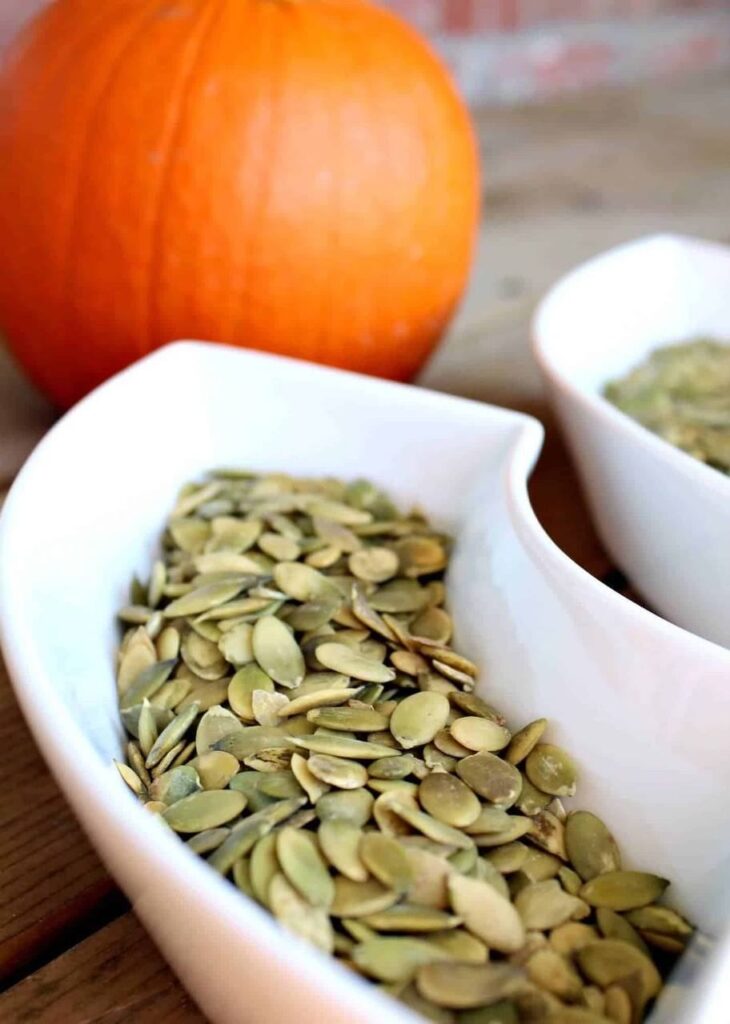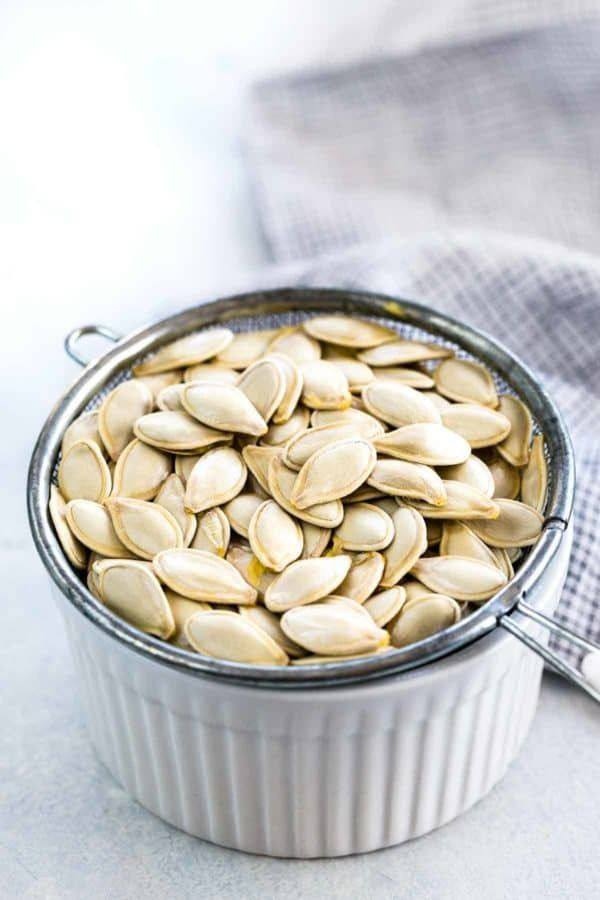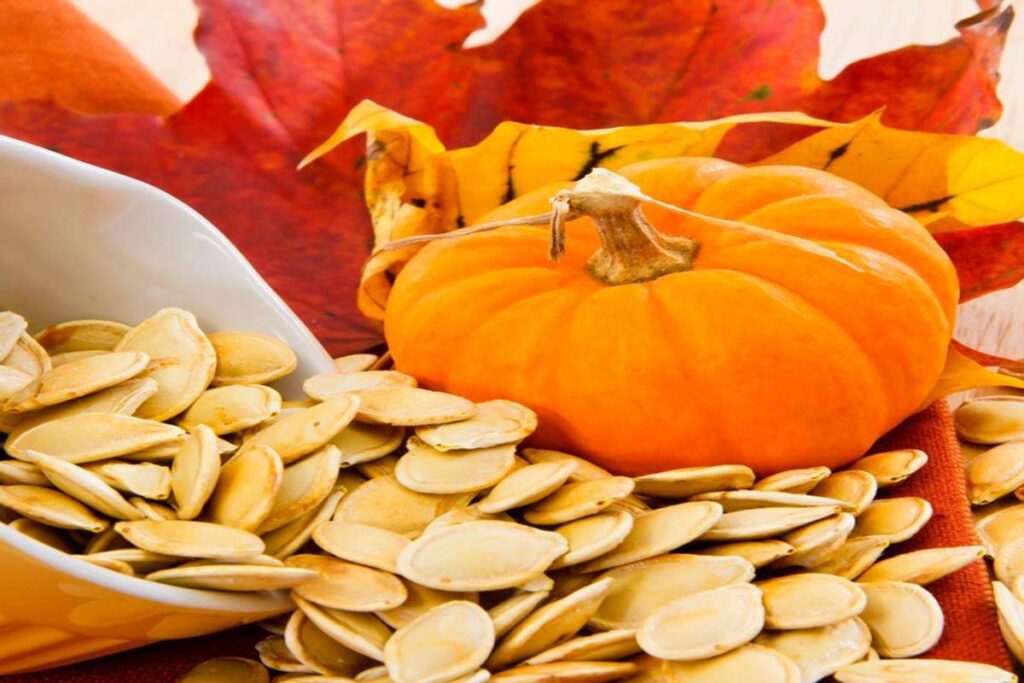Pumpkin seeds are good for our health. Some studies suggest that they might help improve fertility, keep our hearts in good shape, and even help us control our blood sugar levels. Although they may be small, just a tiny amount of these seeds can provide healthy fats, magnesium, and zinc.
Whether you sprinkle them on top of salads or enjoy them as a snack, you’re giving your body some valuable nutrients. Pumpkin seeds are linked to all sorts of benefits, like keeping our hearts healthy, supporting prostate health, and even offering protection against certain types of cancers.
Here are six health benefits of pumpkin seeds that are supported by science.
Pumpkin Seeds Are Full of Valuable Nutrients
Pumpkin seeds can also be called “pepitas,” a term in Mexican Spanish. When you buy them at the supermarket, they usually don’t have a shell. These shell-free seeds are green, flat, and oval. When you snack on them or add them to your recipes, you don’t have to worry about cracking open any shells.

One ounce (oz), or 28 grams (g), of shell-free pumpkin seeds has roughly 160 calories, mainly from fat and protein. In addition, a 1-oz (28-g) serving contains 3 g of carbohydrates, 8.6 g of protein, 14 g of fat, and 1.7 g of fiber.
It also contains Manganese: 56% of the Daily Value (DV), Copper: 42% of the DV, Magnesium: 40% of the DV, Phosphorus: 28% of the DV, Zinc: 20% of the DV, and Iron: 14% of the DV. Pumpkin seeds contain good fats, magnesium, and zinc, and some antioxidants. They also contain small amounts of potassium, riboflavin, and folate.
ALSO READ: What Are the Nutritional Benefits of Tamarind?
Pumpkin Seeds Can Lower Blood Sugar Level
Some older studies with animals have found that pumpkin, pumpkin seeds, pumpkin seed powder, and pumpkin juice could help lower blood sugar levels. A study was done on healthy adults, and they found that when these people had meals with about 65 grams of pumpkin seeds (which is like 2 ounces), their blood sugar levels were lower after eating a high-carb meal.
The high magnesium content of pumpkin seeds might be the secret behind their positive impact on diabetes. A large study that followed people for 28 years found that those who had the most magnesium in their diet had a 15% lower risk of developing type 2 diabetes compared to those who had the least magnesium.
Still, more research is needed to confirm these beneficial effects of pumpkin seeds on blood sugar levels.
It May Help in Improving Heart Health
Pumpkin seeds are packed with antioxidants, magnesium, zinc, and unsaturated fats, which might help keep our hearts healthy. Pumpkin seed oil helps reduce blood pressure and cholesterol, which can put us at risk for heart disease.
An older study was done on 35 postmenopausal women for 12 weeks. They found that when these ladies took pumpkin seed oil supplements, their diastolic blood pressure went down by 7%. Their HDL (good) cholesterol levels went up by 16%.
Other research suggests that pumpkins’ ability to increase nitric oxide generation in your body may be responsible for its positive effects on heart health. Nitric oxide helps blood vessels expand, which means better blood flow and less risk of plaque building up in arteries.
It Reduces the Risk of Certain Cancers
Pumpkin seeds might have plant compounds that help protect against cancer growth. A 2012 observational study found that eating pumpkin seeds was associated with a reduced risk of breast cancer in postmenopausal women.
Some older studies have found that the lignans in the seeds could prevent breast cancer. They might help prevent it and even play a role in treatment. One test-tube study discovered that pumpkin seed extract could slow down the growth and spread of prostate cancer cells.
Improve Prostate and Bladder Health
Pumpkin seeds might be helpful for people dealing with benign prostatic hyperplasia (BPH). BPH is when the prostate gland gets big, causing trouble with peeing.

Several studies in humans found that eating these seeds reduced symptoms associated with BPH. A 2021 study found that when people with BPH took pumpkin seed oil, it helped reduce their symptoms and improved their quality of life. Even though it wasn’t as powerful as a prescription medication, it had fewer negative side effects.
Further research suggests that taking these seeds or their products as supplements can help treat symptoms of an overactive bladder. An older study of 45 people with overactive bladders found that taking 10g of pumpkin seed oil extract daily improved urinary function.
ALSO READ: Does Chlorophyll Have Any Health Benefits for the Body?
Pumpkin Seeds May Help Improve Sleep
If you’re having trouble sleeping, try eating some pumpkin seeds before bed. They contain tryptophan, a natural amino acid that can help promote sleep. According to a 2014 study, consuming at least 1g of tryptophan daily is thought to improve sleep.
However, to achieve the needed amount of tryptophan, you would need to eat around 6 oz (170 g) of pumpkin seeds. They are not only a great source of tryptophan but also packed with magnesium. Some studies have linked having enough magnesium to sleep better.
Some studies have found that taking a magnesium supplement could improve sleep quality. They also claim it decreases the amount of time it takes to fall asleep in older adults with insomnia.
You Might Also Like:
NY Judge Issues Gag Order on Trump in Hush Money Trial Over His “Inflammatory” Remarks
Nervous Travelers Are Changing Flight to Avoid Boeing Airplanes Amid Recurring Aircraft Problems
8 Pastel Makeup Ideas to Try This Spring
Here’s How to Choose the Right Mascara Brush for Your Lashes
